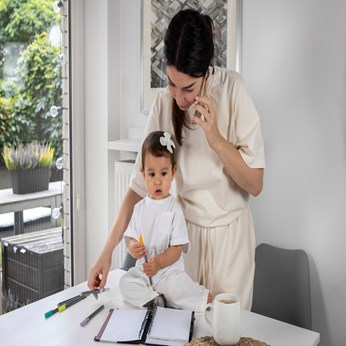10 Important Tips To Communicate With Dementia Elders
It is a challenge caring for elders with dementia with this condition making him/her experience difficulty in remembering things, thinking clearly, communicating with others, and taking care of themselves. They may also experience mood swings and changes in personality and behavior. Good communication skills will help enhance your ability to handle the difficult behavior of dementia elders.
Important tips to communicate with dementia elders:
1) Set a positive mood for interaction by speaking to your loved elder with dementia in a pleasant and respectful way. Your facial expressions, tone of voice and physical touch should convey the message and feelings of affection.
2) Get the elder’s attention by limiting all distractions and noise like the TV; close the curtain, and shut the door. Come down to the level of the elder, maintain eye contact and get his/her attention by addressing him/her by name, identifying yourself by name and relation and use non-verbal cues and touch to keep the elder focused.
3) State the message clearly by using simple words and sentences and speaking in a slow, low, distinct and reassuring tone. Repeat the message a few times till he/she understands; avoid the use of pronouns and abbreviations and use name of places and people.
4) Ask simple answerable questions with Yes and No answers one at a time and avoid open ended questions; it would be better still to show her/him visual prompts and cues also help clarify your question to guide her response.
5) It is best to be patient while waiting for a dementia elder’s reply; help him/her by suggesting words. Carefully observe non-verbal cues and body language and strive to listen and know the feelings that underlie the words.

6) Break up each activity that the elder has to do into a series of much manageable steps and encourage him/her to do what one can; remind him/her by visual cues of the steps that one has forgotten and assist with steps one can no longer accomplish on one’s own.
7) When the elder with dementia gets upset try to distract and redirect by changing the subject or environment and suggesting something more pleasant. Like you could say, “I see you’re feeling sad—I’m sorry you’re upset. Let’s go get something to eat.”
8) It is best to respond with verbal and physical expressions of comfort, support and reassurance when an elder with dementia is anxious and unsure of oneself; holding hands, touching, hugging and praise could also help. If he/she confuses reality it is best to avoid convincing them they are wrong.
9) It could be a soothing and affirming activity for elders with dementia to remember old days; he/she has a long term memory and cannot remember things that took place in recent times. So it is best to avoid asking them questions that involve short-term memory and ask them general questions about the person’s distant past.
10) Maintain your sense of humor, but avoid humor at the elder’s expense; such elders tend to retain their social skills and are usually delighted to laugh along with you.
Image Courtesy: Google
Take the next step toward your goals
Share your requirement and find the best care providers in your area
-
Looking for a caretaker’s job? Build your profile and get in touch with families in your vicinity.
-
Discover nannies, babysitters, cooks, housekeepers, pet sitters, and elder care under one roof.
-
Get all the support you need to run a successful care center.
-
Search for appropriate centers near you depending on your needs.
Care Corner Insights: Blog Library

Deep Cleaning Your House: Room-by-Room Checklist for a Thorough Clean
A sparkling clean home isn’t just about looks—it’s about health, comfort, and peace of mind. Whether you’re prepping for a festival, hosting guests, or just tired of the clutter, a deep clean can transform your space. But where do you start? Here’s a

What are Senior Apartments? Experts Explain Independent Living for Older Adults
As we age, our needs and lifestyles evolve—but one thing remains constant: the desire for independence. Senior apartments are designed precisely with this in mind, offering older adults a living arrangement that balances freedom with comfort, safety,

Baby Sleep Problems: What is Sleep Regression and How to Handle It
If you’re a parent, you know that baby sleep is one of the greatest mysteries of life. One day your little one is snoozing like an angel, and the next day they’re suddenly waking up every hour, fussing, or refusing to nap. Before you panic, there’s a

Daycare Admissions in Cary, NC for New NRI Families: Documents, Health Records, and Start Dates
Moving to a new country is exciting but also comes with many responsibilities—especially when it comes to finding the right daycare for your little one. For new NRI (Non-Resident Indian) families settling in Cary, NC, understanding the daycare

Overnight Babysitters in Bellevue, WA for Business-Travelling NRI Parents: Safety & Policies
For many NRI parents living in Bellevue, WA, frequent business trips are a reality. While traveling, one of the biggest concerns is ensuring your children are safe, cared for, and emotionally supported during overnight stays. Overnight babysitters ca

Indian Home-Style Cooks in Queens, NY: Tiffin-Style Weekly Meal Prep from Your Kitchen
Queens, NY, is home to one of the most diverse food cultures in the country, and Indian cuisine holds a special place among families looking for authentic, comforting meals. While restaurant takeout is convenient, nothing compares to the taste and nu

Baby Sleep Problems: What is Sleep Regression and How to Handle It
If you’re a parent, you know that baby sleep is one of the greatest mysteries of life. One day your little one is snoozing like an angel, and the next day they’re suddenly waking up every hour, fussing, or refusing to nap. Before you panic, there’s a

What is Validation Therapy? A New Approach to Dementia Care
Caring for loved ones with dementia is one of the most emotionally challenging journeys a family can face. Traditional methods often focus on correcting memory lapses or redirecting confused thoughts—but that can sometimes lead to frustration, stress

What is a Part-Time Nanny and Do You Need One
Parenting is a beautiful journey, but let’s be honest—it can also be exhausting! Between work deadlines, household chores, and family responsibilities, sometimes there just aren’t enough hours in a day. That’s where part-time nannies step in, offerin

Part-Time Housekeeper Hiring in Alpharetta, GA: Weekly Schedules, Pricing, and Must-Do Tasks
Keeping a home spotless while balancing work, family, and personal commitments can be overwhelming. For families and professionals in Alpharetta, GA, hiring a part-time housekeeper is one of the most practical solutions. Whether you need help once a